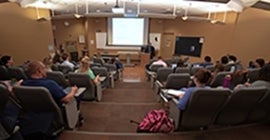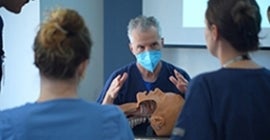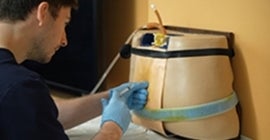- About
- Admissions
- Programs
- Students
- Faculty
- Research
- Institutional Research Training Grants
- Office of Research and Scholarship
- Nursing Research and Scholarship HUBS
- HUB for Excellence in Digital Health Research
- Genomics of Patient Outcomes HUB
- Sleep and Circadian Science Research Hub
- Nursing Health Services and Policy Research HUB
- Cancer Survivorship HUB
- Maternal/Perinatal and Reproductive Health Research Hub
- Aging and Gerontological Nursing Research HUB
- Nursing Education and Clinical Research for EBP HUB
- Active Grants
- Undergraduate Research
- Continuing Ed
- Alumni
- News
- Events
Nurse Anesthesia Major
About our Nurse Anesthesia Major
This DNP Nurse Anesthesia program prepares students through course work that develops knowledge and skill in anesthesia practice as well as in organizational and leadership skills.
Testimonials
View a selection of program reviews from DNP students who graduated within the last two years.
Program Outcomes
View the Nurse Anesthesia Program Outcomes Information.
DNP Projects & Curriculum
Students will complete a scholarly DNP project that reflects the synthesis and application of knowledge gained throughout the curriculum.
- BSN to DNP Curriculum (onsite) - (PDF of BSN to DNP Curriculum)
- MSN to DNP Curriculum (online) The online option is only available to applicants with a master’s degree in same focus.
Clinical Experiences
Students will progress through a series of structured and scaffolded learning activities prior to embarking upon clinical learning experiences.
Simulation Activities
The Pitt Nurse Anesthesia Program is a national leader in simulation education, developing a course on Anesthesia Crisis Management for CRNAs as early as 1994.
Additional Information
Certified Registered Nurse Anesthetist (CRNA): Accreditation, Certification, Licensure/Recognition
Program Accreditation: Forty-nine states, the District of Columbia, Puerto Rico and the Virgin Islands require completion of an accredited nurse anesthetist program for practice. (This number includes those states that imply requiring completion of an accredited program by requiring nurse anesthetists to be certified. Michigan has no reference to completion of an accredited program in their regulations).
Certification: Graduates from accredited Nurse Anesthesia Programs are eligible to sit for the National Certification Examination administered by the National Board for Certification and Recertification of Nurse Anesthetists (NBCRNA). National certification is conferred by the NBCRNA and this allows the graduate of an accredited program to use the title Certified Registered Nurse Anesthetist (CRNA) or Certified Registered Nurse Anesthesiologist (CRNA). Forty-nine US states and the District of Columbia require certification for practice while Michigan and Puerto Rico do not (although the title nurse anesthetist cannot be used in Michigan without national certification).
Licensure and Recognition: In most states, Nurse Anesthetists hold licensure as registered nurses and/or as an ‘advanced practice registered nurse (APRN)”. There are several mechanisms for recognition of Nurse Anesthetists including through Statute, Nurse Practice Acts, State Board of Nursing Rules and Regulations and the Department of Health (New York State).
For the most up to date information, please to the AANA State-Government Affairs website.
You can learn more about our other Nurse Anesthesia Programs: MSN to DNP (online) degree program.
To all Nurse Anesthesia student applicants: The Council on Accreditation of Nurse Anesthesia Educational programs requires that we inform all applicants and current students that as of January 1, 2022 - all students matriculating into an accredited program must be enrolled in doctoral study. The University of Pittsburgh Nurse Anesthesia Program transitioned to the BSN to DNP entry program in January 2017 with our first cohort scheduled to graduate December 2019. The last University of Pittsburgh BSN to MSN graduated in December 2018.






